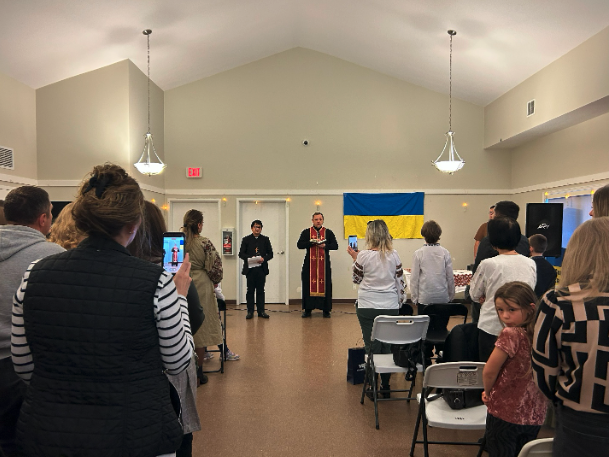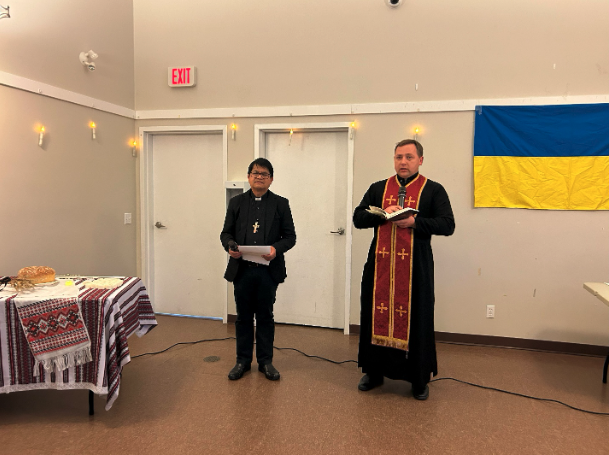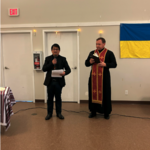Memory, Dignity, and Hope: A Pastoral Reflection on the Holodomor
Dobryi den (добрий день). Good afternoon.
I am grateful to the Ukrainian community for welcoming us and inviting us to take part in this solemn commemoration. It is an honour to stand with you today.
The first time I encountered the word Holodomor was in 1989, while I was a college student browsing through the shelves of our college library. I was taking a Sociology course at the time, and in one of the journals, I came across an article by a Polish American writer whose name, sadly, I no longer remember. But what I do remember is the weight of the story he told, the cruelty, the starvation, the immense suffering deliberately inflicted on a people. Even then, I could sense that this was not simply a tragedy of the past; it was a wound in human history.
Over the years, as life carried me forward, the word slipped from my immediate memory, much as it has for many in the world who have never heard of it or remain unaware or indifferent to it. But memory, as we know, has a way of being awakened.
Upon our arrival in Canada from the Philippines in 2016, I began my ministry in a small Anglican parish in High Prairie, Alberta. One day, a parishioner, herself a Ukrainian whose family had come to Canada in the late 1930s, asked whether I had ever heard of the Holodomor. Her question stirred something profound within me. I told her, ‘Yes, I read about it many years ago. I remember the word, and the horror surrounding it.’ In that moment, the memory of that article, and of that devastating chapter in history, came rushing back.
The Holodomor was not a natural famine. It was not an accident of history. It was a genocide, a deliberate and systematic attempt to break a people, to erase a culture, to eradicate a nation’s spirit. Millions of Ukrainians were starved, punished, and silenced. They were denied not only food but the most basic recognition of their humanity. Their imago Dei, the divine image God has placed in every person, was trampled, ignored, and violated by an ideology that valued power over human dignity.
It is a tragedy that many around the world still know little or nothing about the Holodomor. For some, it remains buried beneath other narratives. For others, it is dismissed or denied. Yet silence is dangerous. Forgetting is dangerous. Because what we refuse to remember, we risk repeating.
And painfully, as we gather today, we acknowledge that the evil that once manifested itself in the Holodomor has found new shapes and new faces in our own time. The aggression, the attempts to suppress identity, the violence against freedom, these shadows reappear. But unlike the 1930s, the world is watching. And thanks be to God, the courage and resilience of the Ukrainian people have inspired nations around the globe to stand with them.
At the heart of the Gospel is the commandment to love God and to love our neighbour, a love that sees and protects the dignity of every human being. In our Christian baptism, we promise to “respect the dignity of every person.” These are not abstract words. They are moral commitments that forbid us from turning away from suffering, from pretending that injustice elsewhere has nothing to do with us. Love requires remembrance. Love requires solidarity. Love requires truth.
And what does this commemoration ask of us today?
It calls us not only to look back, but to look within ourselves:
- To refuse to be indifferent.
- To honour those who perished by ensuring their story is never silenced.
- To stand with all who still face oppression, displacement, and violence in our own time.
- To be courageous witnesses to truth, even when truth is uncomfortable.
It also invites us to see the Ukrainian people not only as victims of a past atrocity, but as living icons of resilience, hope, and the uncrushable dignity God has given every human being. In the face of darkness, whether in the 1930s or today, Ukrainians have shown the world what it means to resist evil with courage, to preserve identity with pride, and to proclaim human dignity with unwavering conviction.
As we remember the Holodomor, may we renew our commitment to justice, peace, and the protection of human dignity. May we draw strength from the memory of those who suffered and from the courage of those who continue to defend freedom today. And may God, who is near to the brokenhearted, bless the people of Ukraine, here, abroad, and in their homeland, with healing, unity, and enduring hope.
Vichna im pam’yat’ (Вічна їм пам’ять). Eternal be their memory.
Note: I am honoured to join Fr. Ivan of the Ukrainian Orthodox Church in Edmonton, who makes the monthly journey to Fort McMurray to provide pastoral care to his faithful community.
Article and pictures submitted by the Rev. Leon Cadsap.





